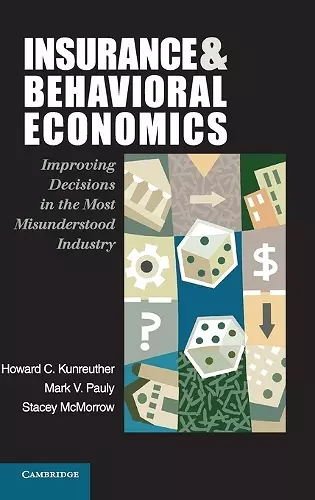Insurance and Behavioral Economics
Improving Decisions in the Most Misunderstood Industry
Mark V Pauly author Howard C Kunreuther author Stacey McMorrow author
Format:Hardback
Publisher:Cambridge University Press
Published:28th Jan '13
Currently unavailable, and unfortunately no date known when it will be back
This hardback is available in another edition too:
- Paperback£26.99(9780521608268)

This book examines the behavior of individuals at risk and insurance industry policy makers involved in selling, buying and regulation.
This book examines the behavior of individuals at risk and insurance industry decision makers involved in selling, buying and regulation. It compares their actions to those predicted by benchmark models of choice derived from classical economic theory and is designed to eliminate the mistrust that characterizes the insurance industry.This book examines the behavior of individuals at risk and insurance industry decision makers involved in selling, buying and regulation. It compares their actions to those predicted by benchmark models of choice derived from classical economic theory. Where actual choices stray from predictions, the behavior is considered to be anomalous. Howard C. Kunreuther, Mark Pauly and Stacey McMorrow attempt to understand why these anomalies occur, in many cases using insights from behavioral economics. The authors then consider if and how such behavioral anomalies could be modified to improve individual and social welfare. This book describes situations in which both public policy and the insurance industry's collective posture need to change. This may require incentives, rules and institutions to help reduce both inefficient and anomalous behavior, thereby encouraging behavior that will improve individual and social welfare.
'For too many people insurance is a mystery not worth solving. The authors of Insurance and Behavioral Economics shed valuable light on insurance products and providers in an insightful examination for the benefit of consumers, analysts, and students of the business. Even the industry would be wise to study the authors' research, conclusions, and recommendations.' Franklin Nutter, President, Reinsurance Association of America
'A challenging and surprisingly engaging analysis of how insurance markets really function. You don't need to agree with all the analyses or recommendations … to recognize that this book is going to be widely read and broadly influential among insurers and regulators.' Leigh Ann Pusey, President and CEO, American Insurance Association
'This book presents a brilliant analysis of the insurance industry as it exists today and will evolve tomorrow. Insurance is fundamental to everything we do: we can see in this book how we can make much better use of it, to improve all of our lives.' Robert Shiller, Yale University
'Insurance is a vital tool for managing risk, but it is misunderstood by consumers, regulators, and industry executives in ways that greatly reduce its effectiveness. In this superb book, Kunreuther, Pauly, and McMorrow employ insights from behavioral economics to clarify these misunderstandings and point the way toward more rational use of insurance to enhance individual and societal welfare.' Paul Slovic, University of Oregon and author of The Feeling of Risk
'Regulators and policy makers have long known that consumers often make seemingly irrational choices when it comes to insurance. Drawing on behavioral economics, the authors provide a framework to understand insurance market anomalies - in both demand and supply - and to evaluate alternative policy prescriptions. Their work is a significant contribution to the discussion on how to best structure insurance regulation to the benefit of consumers and society.' Terri M. Vaughan, Chief Executive Officer, National Association of Insurance Commissioners
'Psychologically, it's hard for most of us to take the initiative on long-term, ill-defined risks. Three scholars - Howard C. Kunreuther and Mark V. Pauly of the University of Pennsylvania and Stacey McMorrow of the Urban Institute - show this in their book. But they argue that if we're aware of them, these psychological impediments can be reduced, and they urge the innovation of long-term risk management contracts that address the problem of climate change.' The New York Times
ISBN: 9780521845724
Dimensions: 235mm x 156mm x 23mm
Weight: 670g
342 pages